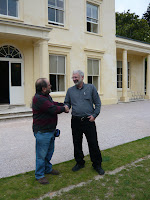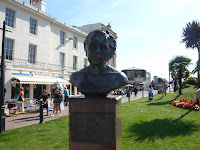

 In 1818 the poet John Keats wrote:
In 1818 the poet John Keats wrote:
Over the hill and over the dale
And over the bourn to Dawlish-
Where gingerbread wives have a scanty sale
And gingerbread nuts are smallish
Last Monday, 13 September, Mr and Mrs Crime Scraps went over the hill to Dawlish, Teignmouth, Torquay, and visited Paignton's brand new £6.4 million lottery funded Library and community hub, to hear Mathew Prichard [Agatha Christie's grandson] and John Curran [author of Agatha Christie's Secret Notebook] in conversation.
That Monday was the opening day for the futuristic library, and it is a tribute to Mathew and John that they overcame teething troubles with the sound system to keep a packed audience enthralled for nearly an hour with their stories and anecdotes about the author.
Mathew welcomed the opening of the new library, and mentioned that his grandmother thought reading was such a very important activity for young people.
John asked Mathew when he realised that his granny was a world famous personality, and we heard the story of the Christies for Christmas. At Mathew's boarding school all the books the pupils brought from home had to go up to be signed by the headmaster to ensure they were suitable reading for a young person. Mathew's Christies were always kept much longer than his friend's books. Years later he asked the headmaster why this had happened, and the headmaster replied that his wife had read them first!
Mathew recalled how his holiday trips as a child to Greenway were so thrilling, and how he looked forward to them so much. When his grandmother, and then his parents, died he thought Greenway died a little with them. The restoration by the National Trust had meant scaffolding and a canopy over the building, but when this came off the house came to life again and he was sure his grandmother would be happy to know that so many people could now enjoy the wonderful house and beautiful gardens with their magnificent view of the Dart.
When John Curran came to visit Greenway in 2005, before the National Trust restoration was started, it was a dark wintry night and the wonderful view escaped him. On a guided tour of the house in what was called the Fax Room he spotted a cardboard box with 73 old exercise and copy books......
John told us how he spent the next 24 hours reading the chaotic notebooks, and needed to be dragged away for meals.
Later John discovered two unpublished short stories in the notebooks; The Incident at Dog's Ball was written in 1933 and never offered for publication but transformed into the novel Dumb Witness in 1935.
John told us that the reason for the failure to publish the other story, The Capture of Cerebus was that it featured a character with the initials AH who had a bullet head and a dark moustache, and in 1939 this would not have been considered suitable escapist literature.
Mathew and John discussed future plans; and Christie fans have to look forward next year to another book by John devoted to the notebooks, computer games, TV and film adaptations, including six more Poirot adaptations with David Suchet, and the possibility Dead Man's Folly being filmed at Greenway. Mathew mentioned that one of his regrets is that his grandmother had never seen David Suchet's superb portrayal of her Belgian detective, Hercule Poirot.
John was asked how he explained the long term popularity of Agatha Christie. He thought it was mainly her readability, and the fact that although her plots were extremely ingenious, the solutions were simple when explained in the denouement.
Would any of today's crime writers be still be read in seventy or eighty years time? John did not think so.
Mathew and John were asked to pick a favourite "Desert Island" book and film. For his book Mathew chose Endless Night [1967], different in tone from her usual work, which he felt showed his grandmother's understanding of young people. For his film the TV adaptation of Five Little Pigs.
John chose the book of Five Little Pigs [1942], and the movie Murder on the Orient Express.
One questioner from the audience pointed out that Agatha Christie was unkind to children in the books, and Mathew was asked how she had appeared to him.
He looked surprised, and it was clear from his reply that his famous grandmother had doted on him.
Mathew then cut the birthday cake 'Delicious Death', and we were then ushered into another room for tea, our portions of Jane Asher's very rich chocolate cake [some of which, not mine, ended up on the brand new carpet], and a book signing.
The event was a stunning success judged by the rush to buy books, and have them signed by Mathew and John.
My only criticism was that the venue was not Greenway, but you can't have everything, and I so enjoyed the event that I bought both Agatha Christie's Secret Notebooks by John Curran, and Agatha Christie, An Autobiography.
























 Last week I had to go away for a couple of days, and the question of what book to take arose. Do I take the hardback I was reading, or do I pick up an easy to pack paperback book from my TBR mountain?
Last week I had to go away for a couple of days, and the question of what book to take arose. Do I take the hardback I was reading, or do I pick up an easy to pack paperback book from my TBR mountain?






 Rob's challenge over at The View From The Blue House is to choose ten pre-1970 classic crime books for someone who has only read contemporary crime fiction. I covered some of this ground with my Dartmoor Dozen choices [click and scroll down for all the posts on this subject] last year but decided to slightly vary my choices this time, although of course there are some authors and some books you just cannot ignore in making a classic crime fiction selection.
Rob's challenge over at The View From The Blue House is to choose ten pre-1970 classic crime books for someone who has only read contemporary crime fiction. I covered some of this ground with my Dartmoor Dozen choices [click and scroll down for all the posts on this subject] last year but decided to slightly vary my choices this time, although of course there are some authors and some books you just cannot ignore in making a classic crime fiction selection.